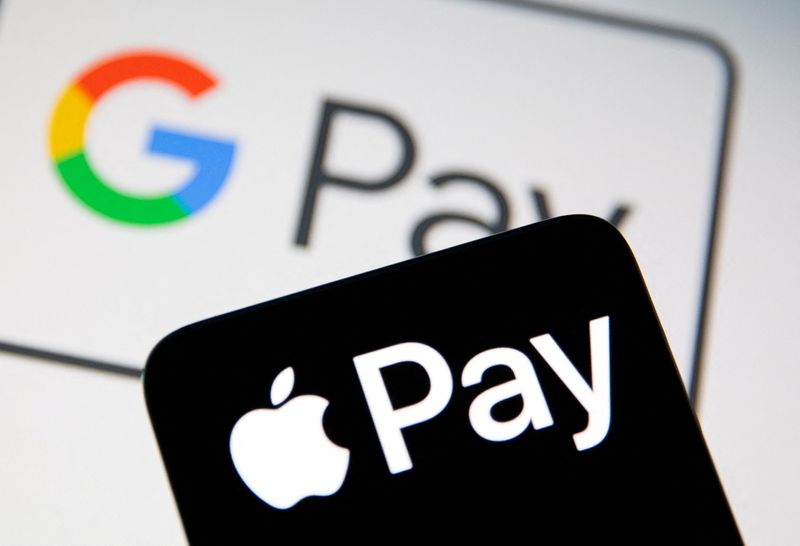By Hannah Lang
(Reuters) - The U.S. consumer watchdog, not usually known to side with Wall Street lenders, has handed them a rare win by cracking down on Big Tech companies that are increasingly encroaching on banking turf.
The Consumer Financial Protection Bureau (CFPB) last week proposed regulating payments and smartphone wallets provided by tech leaders like Apple (NASDAQ:AAPL) and Google (NASDAQ:GOOGL), arguing they now rival traditional bank services in scale and scope and should be subject to the same consumer safeguards.
The long-anticipated move by CFPB Director Rohit Chopra, who built his career targeting Big Tech over privacy and competition issues, gives a competitive boost to lenders grappling with an onslaught of new rules from capital hikes and caps on debit and credit cards fees to tougher fair lending standards.
"The banks are under almost a bunker mentality right now. They are getting hit from a lot of different places," said Todd Phillips, a professor at Georgia State University. "So when a regulator basically says, we are going to start treating your competition a lot like the way we treat you, that is good news."
U.S. oversight of Big Tech financial services is fragmented. Companies must apply to each state for money transmitter licenses, and are subject to oversight by various regulators.
The CFPB rule would toughen up supervision, requiring Big Tech to comply with its rules on privacy protections, executives' conduct and unfair and deceptive practices.
Seventeen companies would be affected including Apple, Google, PayPal (NASDAQ:PYPL) and Block's CashApp, which together facilitated roughly $1.7 trillion worth of payments in 2021, the CFPB said. The value of all non-cash payments - excluding wire transfers primarily used for large transfers - was $128.51 trillion in 2021, Federal Reserve data shows.
The CFPB already supervises PayPal and CashApp under its international money transfer rules, but Apple and Google would be subject to CFPB oversight for the first time. Google declined to comment and Apple did not respond to a request for comment.
"Silicon Valley is already a major part of the financial marketplace," the CFPB said in a statement. Subjecting large tech companies in the payments market to similar oversight as banks will increase competition, the agency said.
While tech giants rely on banks to process payments via bank-issued credit and debit cards, some - like Apple - charge lenders a fee for those transactions. The CFPB has also expressed concern that tech companies could be monetizing customer data and compromising user privacy.
According to McKinsey research cited by the CFPB, big tech companies, by some measures, have surpassed regional and community banks in terms of consumer trust related to digital payments. Without regulatory scrutiny, they could leverage their growing dominance of consumer payments to capture other services like lending and card issuing, analysts said.
Worried by this trend, the banking industry has been lobbying financial regulators to crack down on tech giants, arguing in public letters, blogs and congressional testimony that they are putting consumers' privacy at risk.
They called for the CFPB to invoke its authority under the 2010 Dodd-Frank law to designate "larger participants" in the nonbank market for consumer financial products. Washington trade group the Bank Policy Institute is among those leading that campaign.
"It's just not necessarily always clear to your average consumer what the differences are between a regulated and insured bank versus a totally unregulated tech company," said Paige Pidano Paridon, senior associate general counsel at BPI.
Banks, for example, are required by law to disclose their information-sharing practices to their customers and face limits on what consumer data they can share with third parties.
'LEG UP'
Representatives for Big Tech have accused the CFPB of trying to protect traditional lenders.
The Chamber of Progress, a tech industry coalition whose partners include Apple and Google, said last week the proposal was "more about giving Wall Street a leg up" than protecting consumers. The CFPB did not address a query on that claim.
Chopra has also been critical of bank practices and has targeted the fees they charge consumers, among other measures.
While Big Tech companies have deep pockets and plenty of resources to handle the new scrutiny, the rule could limit how they use and protect consumer data.

Legal experts also said the CFPB clearly has the authority to regulate Big Tech's payment businesses, suggesting the industry may not fight the proposal. The CFPB is accepting public feedback on the proposal until early 2024.
"From the perspective of large technology companies, you might even prefer to be supervised, because the agency is not going away," said John Coleman, a partner at Orrick, Herrington & Sutcliffe.